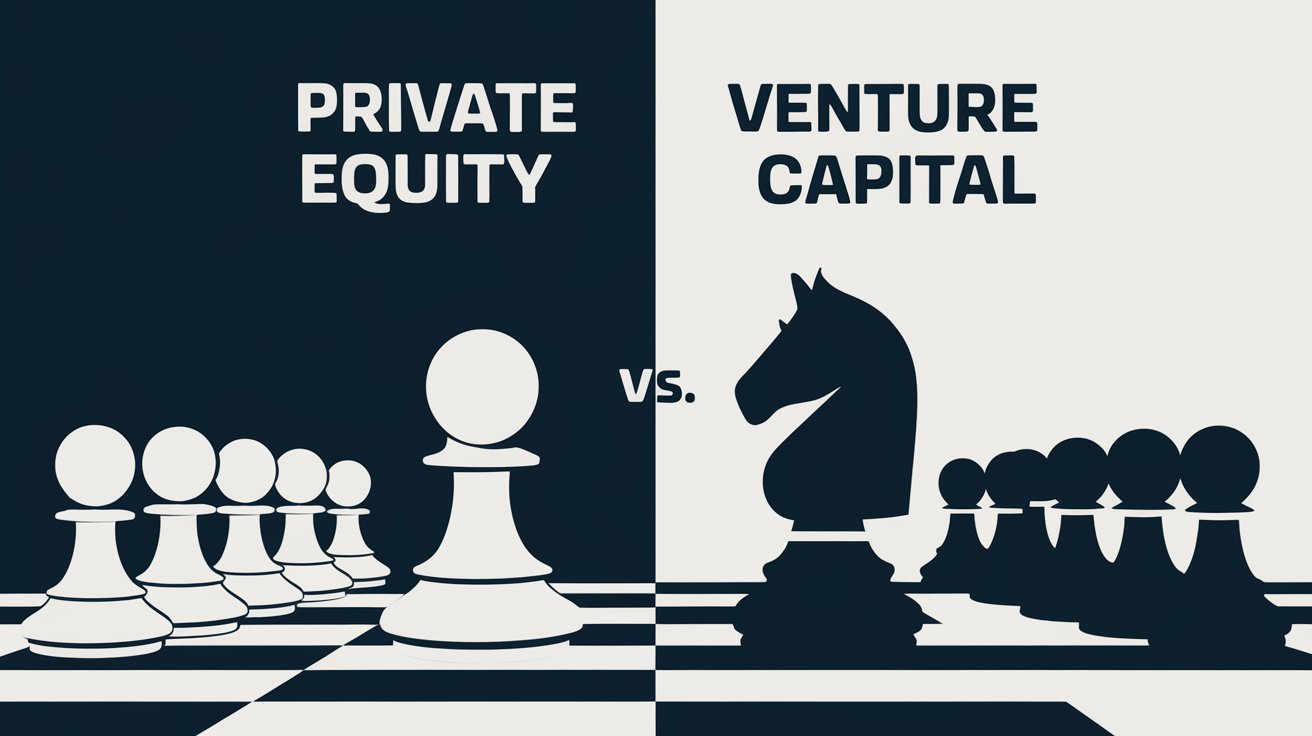- Home
- /
- Venture Capital
- /
- Private Equity vs. Venture Capital
Introduction
In the world of finance and investment, private equity and venture capital are often mistaken for one another. Yet, despite some similarities, these two forms of investment are distinct in terms of structure, strategy, and the kind of companies they target. If you’re navigating the intricate realm of financial investments, it’s essential to understand the nuances between these investment strategies. This article will dive deep into what sets private equity apart from venture capital, with real-life examples, case studies, and FAQs to give a well-rounded understanding.
About Private Equity

Private equity (PE) refers to investment firms or funds that invest directly into private companies, or in some cases, take public companies private. These firms typically invest in mature businesses that are already generating revenue but need restructuring or capital injection for growth.
Key Features of Private Equity
- Targets mature companies needing restructuring or expansion.
- Focus on buyouts or substantial stakes in companies.
- Generally holds the investment for 5 to 10 years.
- Aim to enhance the company’s operational efficiency, grow its market share, or improve its profitability before exiting the investment.
About Venture Capital

On the other hand, venture capital (VC) focuses on early-stage or startup companies that are high-risk but also have high-growth potential. Venture capitalists provide not only funding but also mentoring and guidance to help these young companies reach their full potential.
Key Features of Venture Capital
- Invests in early-stage startups with significant growth potential.
- Focuses on industries such as technology, healthcare, and clean energy.
- Investments are typically for equity stakes and are smaller in size compared to private equity.
- More hands-on approach in mentoring and guiding startups through their growth journey.
Private Equity vs. Venture Capital
Investment Focus: Mature vs. Startups

One of the fundamental distinctions between PE and VC is the type of companies they invest in. Private equity firms usually focus on mature companies that have already demonstrated a steady cash flow but may need operational improvements. This could include companies in traditional sectors such as manufacturing, consumer goods, or even infrastructure. In contrast, venture capitalists typically focus on startups in emerging industries like technology, fintech, or biotechnology, often before these companies have proven their profitability.
Case Study: Private Equity
Consider the case of KKR, one of the largest private equity firms globally. In 2011, KKR acquired GoDaddy, a web hosting and domain registration company, for around $2.25 billion. GoDaddy was already a well-established player in its field but needed operational improvements and a broader market strategy. Under KKR’s guidance, GoDaddy expanded its product line, improved its customer service, and eventually went public in 2015, allowing KKR to exit with a considerable profit.
Case Study: Venture Capital
In contrast, take the example of Sequoia Capital and its investment in WhatsApp. Sequoia invested $8 million in WhatsApp in 2011 when it was still a startup with only a few employees. WhatsApp rapidly scaled up and, in 2014, was acquired by Facebook for $19 billion. This early-stage investment netted Sequoia a significant return, exemplifying the high-risk, high-reward nature of venture capital.
Investment Structure: Ownership vs. Equity Stakes

Private equity firms often prefer complete buyouts or majority stakes, allowing them to take full control of the company. Once in control, they make operational changes to improve the company’s profitability and value. The goal is to sell the company or list it on the stock market for a much higher valuation than what they paid for it.
In contrast, venture capitalists typically invest in equity stakes, often taking a minority position in the company. They might invest in several funding rounds, each time providing capital in exchange for a share in the company’s equity. The aim here is to provide the startup with the resources it needs to grow and eventually exit through a public listing (IPO) or a sale to a larger company.
Risk and Returns: Stable Growth vs. High Risk, High Reward

When it comes to risk and returns, the difference is stark. Private equity investments tend to involve lower risk because they invest in established businesses. The potential for growth is typically slower but more predictable, and the exit strategies are clearer, such as a sale or IPO.
On the flip side, venture capital is synonymous with high risk. Startups may fail, and VCs are well aware that they could lose their investment. However, a few successes can bring enormous returns. Investments in companies like Uber, Airbnb, and Stripe by early-stage venture capitalists have yielded extraordinary returns, showcasing the immense upside potential.
Time Horizon: Long-Term Commitment vs. Shorter Cycles

Private equity investments are typically long-term. PE firms often hold onto companies for anywhere from 5 to 10 years, working on operational improvements before making an exit. This long-term focus is suitable for companies requiring major overhauls or time-intensive growth strategies.
Venture capital, on the other hand, often sees shorter investment cycles. While some VC investments might stretch for over a decade, especially in slower-growing sectors like biotechnology, most tech-related startups aim to exit within 3 to 7 years.
Exit Strategies: IPOs, Sales, and Beyond

Private equity firms typically aim for exits that will provide them with substantial profits. Initial Public Offerings (IPOs) and strategic sales to other companies are common exit strategies. For example, private equity giant Blackstone acquired Hilton Worldwide and later exited through a public listing, reaping massive returns.
For venture capital, the focus is often on acquisitions or IPOs as well. Since startups are often less predictable, a successful exit might involve being acquired by a tech giant, as was the case with Instagram, which was sold to Facebook, or through a public listing like Airbnb‘s IPO.
Case Study: Blackstone vs. Airbnb
Blackstone’s acquisition of Hilton Worldwide in 2007 for $26 billion is a classic private equity move. After restructuring the company and expanding its operations globally, Blackstone took Hilton public in 2013, earning over $10 billion in profit.
Contrast this with Airbnb’s journey. Airbnb was backed by several venture capital firms, including Andreessen Horowitz and Sequoia Capital, during its early stages. After years of rapid growth, Airbnb went public in 2020, giving its venture capital investors substantial returns, with some earning as much as $12 billion.
Frequently Asked Questions (FAQs) on Private Equity vs. Venture Capital

1. Are private equity and venture capital the same?
No, they are different forms of investment. Private equity focuses on mature companies, while venture capital targets early-stage startups.
2. Is venture capital riskier than private equity?
Yes, venture capital is generally riskier because it invests in startups that have not yet proven their business model.
3. What kind of companies do private equity firms target?
Private equity firms usually invest in well-established businesses that need restructuring or expansion.
4. How do venture capitalists make money?
Venture capitalists make money through successful exits, either by selling the company or through an IPO.
5. What’s the typical investment horizon for private equity?
Private equity firms typically hold their investments for 5 to 10 years before exiting.
Conclusion

In conclusion, while both private equity and venture capital provide critical financial lifelines to companies, they operate in vastly different arenas. Private equity is more suited for those looking to invest in mature companies with stable cash flows but room for improvement, while venture capital is for those willing to take on the high risk that comes with investing in startups. Each has its place in the investment world, and understanding the differences can help investors make more informed decisions about where to allocate their resources.
Both strategies can offer tremendous returns, but they also require distinct approaches, mindsets, and risk appetites. Whether you’re looking at established businesses or cutting-edge startups, the choice between private equity and venture capital is one that hinges on your investment goals and timeline.
Enjoyed this article? Dive deeper into venture capital with our detailed guide—check it out here. Plus, explore our curated resources on venture capital right here.




















Leave a Reply